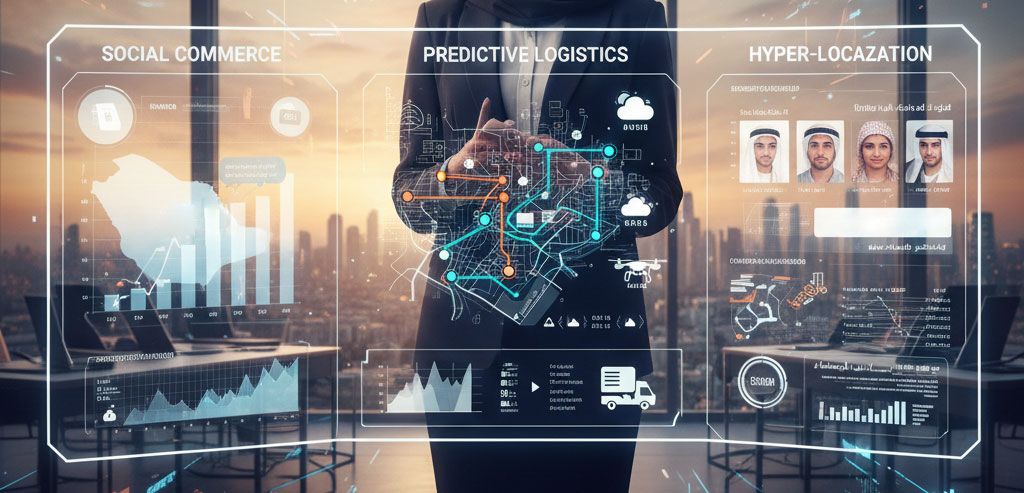
Beyond ChatGPT: 3 AI Trends That Will Actually Shape MENA Marketing in 2026
If you’re planning your 2026 marketing strategy, you’re probably talking about AI. But let’s be blunt: if that conversation is still about using ChatGPT to write blog posts, you’re already a year behind.
As an AI-powered agency, we’ve moved past that. Using AI for basic content generation is now just the entry fee. It’s not a strategy; it’s a commodity. The real AI revolution in the MENA region won’t be about writing; it will be about solving our unique, complex logistical and cultural challenges.
The future isn’t about replacing your content writer. It’s about building a smarter, faster, and hyper-personalized business.
Here’s the chain of thought on the three AI trends that will actually define “AI-powered marketing” in the MENA region in 2026.
1. AI in Social Commerce: The “Culturally-Fluent” Chatbot
We know the MENA region runs on chat. A customer in Riyadh or Cairo would rather send a WhatsApp message than fill out a web form.
The first generation of AI chatbots was useful but “robotic.” They could take an order.
The next generation of AI will be a cultural expert and a master salesperson.
Imagine a customer DMs your e-commerce brand on WhatsApp. The AI doesn’t just say, “How can I help you?” It accesses their purchase history and instantly replies in a perfect, persuasive Khaleeji dialect: “Ahlan, Mohammed. I see you bought the blue blazer last month. The matching trousers are now in stock and on sale for you. Would you like to see them?”
This AI will understand local nuance, sentiment, and dialect—speaking “Masri” to a customer in Cairo and “Khaleeji” to a customer in Jeddah. This isn’t just “personalization”; it’s hyper-localization. It’s the single biggest leap forward for social commerce in our region.
2. AI in Predictive Logistics: Solving the “Last-Mile” Problem
In the e-commerce hubs of Dubai and the sprawling cities of Saudi Arabia, the single biggest point of failure isn’t the website; it’s the “last-mile” delivery. A late package or a returned item can destroy your profit margins.
Right now, businesses are reactive. You wait for an order, then you ship it.
In 2026, AI will make logistics predictive.
AI models will analyze regional buying patterns, weather, local holidays, and even social media trends to predict what your customers will buy before they even click.
This means:
- Smarter Inventory: Your warehouse in Dubai will automatically stock up on items trending in Riyadh, a week before the trend hits its peak.
- Optimized Routes: AI will manage your delivery fleet, optimizing routes in real-time to navigate traffic in Cairo or complex addresses in a new development.
- Reduced Returns: AI will flag potential “problem” orders (e.g., a customer who frequently buys and returns) for manual review.
AI in logistics isn’t a “marketing” trend, but it’s the single most important factor for building Trust (the ‘T’ in E-E-A-T). A brand that delivers on time, every time, will win.
3. AI in Transcreation: Building Real Local E-E-A-T
We’ve talked about how “bad” AI translation can get you penalized by Google for failing the E-E-A-T test. The future of AI isn’t translation; it’s transcreation.
“Translation” is changing words. “Transcreation” is recreating the entire message with cultural and emotional respect.
- Translation (The Bad Way): Taking your English “Summer Fun” ad campaign and directly translating it—even if you launch it during a somber local holiday.
- Transcreation (The AI-Assisted Way): A human expert will use AI as an assistant. The AI will analyze your “Summer Fun” campaign and flag it, saying: “This message may be poorly received in [Country] due to [Local Event]. A more appropriate theme would be ‘Family Togetherness.’ Here are 3 alternative campaign ideas based on local cultural values.”
The AI becomes a cultural consultant, helping your human team build real, local Experience and Trust. It stops you from making costly, embarrassing mistakes and helps your brand feel truly native, not just translated.
The Takeaway
As an “AI-powered agency,” we’re excited about the future. But not because AI can write a blog post.
We’re excited because AI is about to solve the real business challenges of the MENA region: personalized communication at scale, complex logistics, and deep cultural fragmentation.
The agencies that master these tools won’t just be “AI-powered”; they’ll be “business-builders.”
Ready to make AI data-driven decisions for your brand?
Creatives can help!
Our team of AI-powered digital marketing experts can guide you in harnessing the power of data to achieve your marketing goals.
Schedule a consultation to learn how our AI-powered solutions can drive growth.

